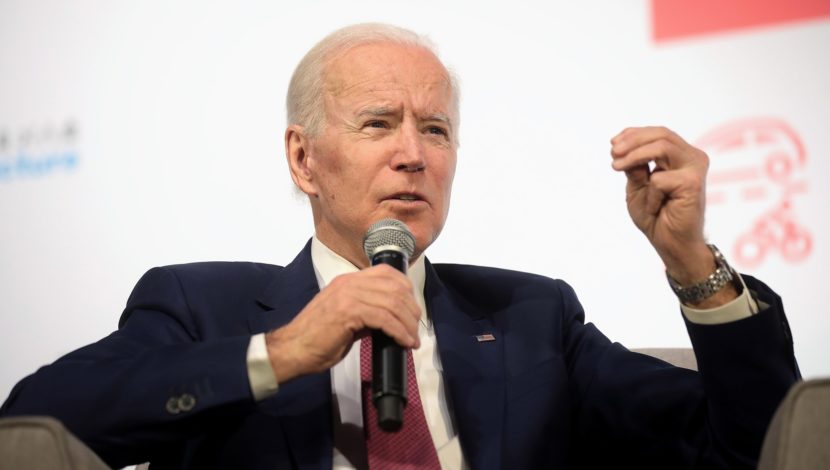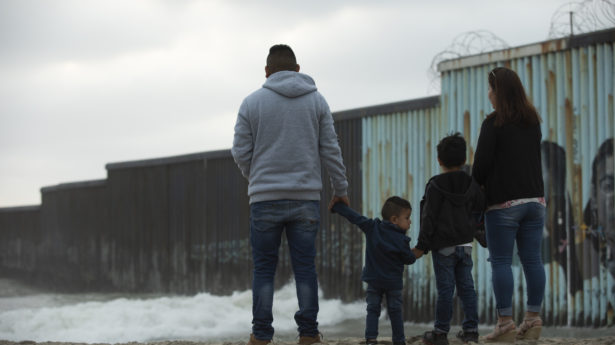The Unitarian Universalist Service Committee advances human rights through grassroots collaborations.
UUSC Response to Biden’s First State of the Union

By on March 2, 2022
Last night, Joe Biden delivered the first State of the Union address of his presidency. While the speech touted a number of his administration’s legitimate accomplishments and issued an impassioned call for national unity in the face of the unfolding crisis in Ukraine, it was also striking for what it did not mention—namely, the vast majority of Biden’s unfulfilled campaign promises to advance human rights.
Biden began the speech with an extended discussion of steps his administration is taking in response to Vladimir Putin’s aggression in Ukraine—a crisis that has already displaced more than 600,000 people. The president proclaimed U.S. solidarity with the Ukrainian people, yet made no mention of the one simplest and most direct step his administration can take to support people displaced by the fighting: namely, issuing Temporary Protected Status (TPS) to ensure that Ukrainians already in the United States are not deported to peril. His administration has yet to take this common-sense step.
Nor did Biden mention the many Black and brown immigrants, asylum-seekers, and refugees living in Ukraine who have also been affected by the crisis—and who have faced discrimination, racism, and mistreatment in their efforts to escape the danger. Our leaders must speak out against anti-Blackness in every context, and work to address its manifestations in U.S. border policies as well.
Biden next turned to an extended discussion of the major pieces of legislation Congress has passed under his watch—including the American Rescue Plan and a $1.2 trillion bipartisan infrastructure package. The president rightly celebrated the positive features of these bills, including the support they will provide for lead remediation and broadband internet access for rural and tribal communities. Investment in these social needs represents real progress toward furthering the human rights of Indigenous communities who have been disproportionately impacted by climate change and climate-induced displacement.
Yet Biden’s feel-good talk of funding new electric vehicles and clean energy initiatives failed to convey the urgency of the planetary crisis we face as a result of global warming. His State of the Union speech came just one day after the United Nations’ leading climate scientists issued their “bleakest warning yet” on the state of the planet’s ecosystems; yet Biden did not use the address as an opportunity to call for stronger global action to combat climate change, promise to protect communities on the front lines of the crisis, or pledge new reductions in greenhouse gas emissions.
Meanwhile, the president’s coverage of the state of the nation’s pandemic response was equally lopsided. Biden talked about how—under new federal guidelines—most U.S. residents will soon no longer be expected to wear masks, claiming that we have reached a point as a nation where “COVID-19 need no longer control our lives.”
Yet, even as the administration claims (without convincing evidence) that masks are no longer necessary in most cases, and invites U.S. citizens to enjoy a sense of personal freedom from pandemic restrictions, they continue to invoke COVID-19 (with no scientific basis) as a pretext to expel asylum-seekers from the border without due process. In the past year, Biden’s administration has forcibly ejected people more than 1.1 million times without an asylum hearing—a blatant violation of international law. More than 20,000 people impacted by this policy are Haitian asylum-seekers—including families and children—who have been expelled to their home country while it faces a grave political and humanitarian crisis.
If Biden truly believed this policy was justified and rooted in public health, why did he not mention it once in speaking of his pandemic response? At one point in Biden’s speech, there came an odd moment when he began to say, “you cannot wall out” COVID-19, yet paused before completing the sentence. Perhaps he realized too late that his own harmful and unscientific anti-asylum policies are at odds with his words?
Biden next turned his attention to policing. The president’s repeated calls for increased funding for police departments and tepid nods toward low-level police reforms were a far cry from the bold transformations that communities were promised in 2020 in the wake of the murder of George Floyd, Breonna Taylor, and other unarmed Black people at the hands of cops.
A similarly hard pivot right-ward was visible in Biden’s brief discussion of immigration. The president led this short segment of his speech with a call for increased border enforcement. He touted his investment in border surveillance even as these technologies are almost certain to push people into deadlier terrain and lead to more migrant deaths. Biden then disingenuously spoke of “keeping lit the torch of liberty” for future generations of immigrants, without mentioning once that his own anti-asylum policies—as we saw above—are resulting in the forced expulsion of thousands of people to life-threatening conditions.
This does not mean there is nothing to celebrate in Biden’s speech or his presidency. His nomination this week of Ketanji Brown Jackson to the Supreme Court, as well as his strong words of solidarity with transgender youth experiencing discrimination as a result of anti-LGBTQI+ legislation at the state level, are milestones to celebrate—small steps though they are toward rectifying generations of exclusion and oppression.
But there is also no reason for communities to have to settle for less than the entirety of what this administration promised. President Biden committed to deliver on human rights priorities across the board, and many of the steps that still need to be taken are well within the scope of his authority. The president should follow up his words with more genuinely inspiring action. Otherwise—speeches aside—the climate crisis, structural racism, militarism and violence that imperil our collective future will have the last word.
Photo Credit: Gage Skidmore from Surprise, AZ, United States of America, CC BY-SA 2.0, via Wikimedia Commons

